Stephen Fry quotations and quotes on God & Creationism
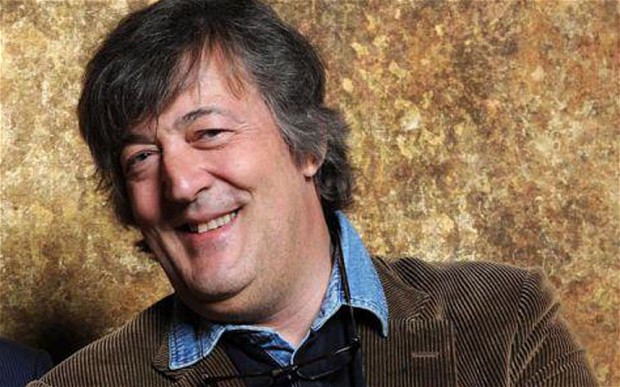
A number of variously interesting, amusing, perceptive and provocative quotations and quotes from Stephen Fry about Gods, Religions, Faith and Religious Beliefs are featured on this page.

This presentation includes a recent, January 2015, Youtube clip of an interview for Irish television where Stephen Fry actually uses such terms as "utter maniac" and "totally selfish" in relation to God. In particular, given the existence of suffering through disease and the activity of parasites that seems inconsistent with what are popularly supposed to be the attributes of an all-powerful and charitable God, Stephen Fry expresses potent criticisms towards a "monstrous, utterly monstrous", Creationism.
These comments were made during the recording of an interview that was intended to appear on an Irish TV series, 'The Meaning of Life', where interviewees were invited, by an enduringly popular pillar of Irish broadcasting named Gay Byrne, to share their views and opinions.
A brief selection of other comments attributable to Stephen Fry and related to God, Religion, and Belief, are then considered.
Stephen Fry on Creationism ~
THAT Youtube clip from Irish TV
The following clip was actually uploaded to Youtube by Irish television broadcaster RTÉ prior to screening of an episode of this, 'The Meaning of Life', TV series where Stephen Fry guested, and drew more than two million on-line viewings over two or three days before the actual Irish TV broadcast on Sunday 1 February 2015.
This footage features Stephen Fry airing certain views on God and Creationism and gave rise to a notable storm of controversy.
A transcription and some noteworthy post-interview further comments from Stephen Fry and Gay Byrne in the immediate aftermath, (for want of a better word), of the first broadcast on Irish TV of
the full episode are available by following a link that appears just after the Youtube clip.
Transcription of this Irish TV interview clip
with key further comments from Stephen Fry and Gay Byrne
"I don't think we should ever allow religion the trick of maintaining that the spiritual and the beautiful and the
noble and the altruistic and the morally strong and the virtuous are in any way inventions of religion or
particular or peculiar to religion."
with key further comments from Stephen Fry and Gay Byrne
More from Stephen Fry on God, Religion, Faith and Belief
The Blasphemy Debate with Christopher Hitchens.
On the Guardian website ~ Hay Festival pages

"I mean it's perfectly obvious that if there were ever a God he has lost all possible taste. You've only got to look - forget the aggression and unpleasantness of the radical right or the Islamic hordes to the East - the sheer lack of intelligence and insight and ability to express themselves and to enthuse others of the priesthood and the clerisy here, in this country, and indeed in Europe, you know God once had Bach and Michelangelo on his side, he had Mozart, and now who does he have? People with ginger whiskers and tinted spectacles who reduce the glories of theology to a kind of sharing, you know?"
(A distinctly possible side-swipe here in the then Archbishop of Canterbury being bearded and bespectacled).
The Blasphemy Debate with Christopher Hitchens.
On the Guardian website ~ Hay Festival pages

Is Human Being more truly Metaphysical than Physical?
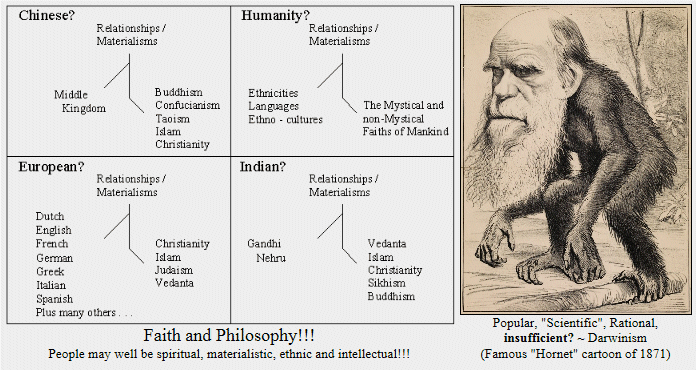

Ralph Waldo Emerson
RALPH WALDO EMERSON (1803-1882) was, in his time, the leading voice of intellectual culture in the United States. He remains widely influential to this day through his essays, lectures, poems, and philosophical writings.
In the later eighteen-twenties Ralph Waldo Emerson read, and was very significantly influenced by, a work by a French philosopher named Victor Cousin.
A key section of Cousin's work reads as follows:
"What is the business of history? What is the stuff of which it is made? Who is the personage of history? Man : evidently man and human nature.
There are many different elements in history. What are they? Evidently again, the elements of human nature. History is therefore the development of humanity,
and of humanity only; for nothing else but humanity develops itself, for nothing else than humanity is free. …
… Moreover, when we have all the elements, I mean all the essential elements, their mutual relations do, as it were, discover themselves. We draw from the nature of these different elements, if not all their possible relations, at least their general and fundamental relations."
Introduction to the History of Philosophy (1829)
… Moreover, when we have all the elements, I mean all the essential elements, their mutual relations do, as it were, discover themselves. We draw from the nature of these different elements, if not all their possible relations, at least their general and fundamental relations."
Introduction to the History of Philosophy (1829)
Even before he had first read Cousin, (in 1829), Emerson had expressed views in his private Journals which suggest that he accepted that Human Nature, and Human Beings, tend to display three identifiable aspects and orientations:
Imagine hope to be removed from the human breast & see how Society will sink, how the strong bands of order & improvement will be relaxed & what a deathlike stillness would take the place of the restless energies that now move the world. The scholar will extinguish his midnight lamp, the merchant will furl his white sails & bid them seek the deep no more. The anxious patriot who stood out for his country to the last & devised in the last beleagured citadel, profound schemes for its deliverance and aggrandizement, will sheathe his sword and blot his fame. Remove hope, & the world becomes a blank and rottenness.
(Journal entry made between October and December, 1823)
In all districts of all lands, in all the classes of communities thousands of minds are intently occupied, the merchant in his compting house, the mechanist over his plans, the statesman at his map, his treaty, & his tariff, the scholar in the skilful history & eloquence of antiquity, each stung to the quick with the desire of exalting himself to a hasty & yet unfound height above the level of his peers. Each is absorbed in the prospect of good accruing to himself but each is no less contributing to the utmost of his ability to fix & adorn human civilization. (Journal entry of December, 1824)
Our neighbours are occupied with employments of infinite diversity. Some are intent on commercial speculations; some engage warmly in political contention; some are found all day long at their books … (This dates from January - February, 1828)
In all districts of all lands, in all the classes of communities thousands of minds are intently occupied, the merchant in his compting house, the mechanist over his plans, the statesman at his map, his treaty, & his tariff, the scholar in the skilful history & eloquence of antiquity, each stung to the quick with the desire of exalting himself to a hasty & yet unfound height above the level of his peers. Each is absorbed in the prospect of good accruing to himself but each is no less contributing to the utmost of his ability to fix & adorn human civilization. (Journal entry of December, 1824)
Our neighbours are occupied with employments of infinite diversity. Some are intent on commercial speculations; some engage warmly in political contention; some are found all day long at their books … (This dates from January - February, 1828)
The quotes from Emerson are reminiscent of a line from another "leading voice of intellectual culture" - William Shakespeare.
There's neither honesty, manhood, nor good fellowship in thee.
William Shakespeare: Henry IV (Pt 1), Act I, Scene II
William Shakespeare: Henry IV (Pt 1), Act I, Scene II
"The first glance at History convinces us that the actions of men proceed from their needs, their passions, their characters and talents; and impresses us with the belief that such needs, passions and interests are the sole spring of actions."
Georg Hegel, 1770-1831, German philosopher, The Philosophy of History (1837)
Plato, Socrates and Shakespeare endorse a Tripartite Soul view of Human Nature. Platos' Republic
Understanding the Past and Present. Why is the World the way it is today?
Understanding the Past and Present. Why is the World the way it is today?

"I am a lover of truth, a worshipper of freedom, a celebrant at the altar of language and purity and tolerance. That is my religion, and every day I am sorely, grossly, heinously and deeply offended, wounded, mortified and injured by a thousand different blasphemies against it. When the fundamental canons of truth, honesty, compassion and decency are hourly assaulted by fatuous bishops, pompous, illiberal and ignorant priests, politicians and prelates, sanctimonious censors, self-appointed moralists and busy-bodies, what recourse of ancient laws have I? None whatever. Nor would I ask for any. For unlike these blistering imbeciles my belief in my religion is strong and I know that lies will always fail and indecency and intolerance will always perish."
"Trefusis Blasphemes" radio broadcast

"You can't just say there is a God because well, the world I beautiful. You have to account for bone cancer in children. You have to account for the fact that almost all animals in the wild live under stress with not enough to eat and will die violent and bloody deaths. There is not any way that you can just choose the nice bits and say that means there is a God and ignore the true fact of what nature is. The wonder of nature must be taken in its totality and it is a wonderful thing. It is absolutely marvelous and the idea that an atheist or a humanist if you want to put it that way, doesn't marvel and wonder at reality, at the way things are, is nonsensical. The point is we wonder all the way. We don't just stop and say that which I cannot understand I will call God, which is what mankind has done historically."
"The Importance of Unbelief".
Interview on bigthink.com - recorded December 8, 2009
The following image is sourced from a humanistic presentation on The Meaning of Life by Stephen Fry
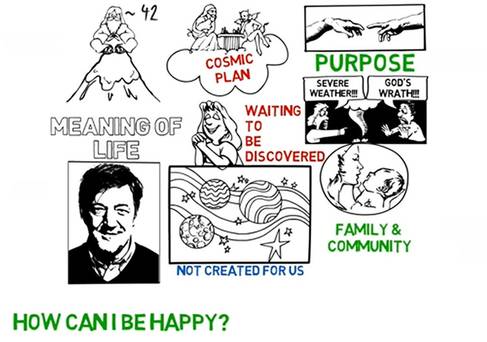
"Some people think ... that the universe was created for a purpose and that human beings were part of some larger cosmic plan. They think our meaning comes from being part of this plan, and is written into the universe, waiting to be discovered."
"The humanist view of the meaning of life is different. Humanists do not see that there is any obvious purpose to the universe, but that it is a natural phenomenon with no design behind it. Meaning is not something out there, waiting to be discovered, but something we create in our own lives."
"And although this vast and incredibly old universe was not created for us, all of us are connected to something bigger than ourselves, whether it is family and community, a tradition stretching in the past, an idea or cause looking forward to the future, or the beautiful natural world on which we were born and our species evolved."
All sourced from a humanistic presentation on The Meaning of Life by Stephen Fry
British Humanist Association
Stephen Fry has presented a very popular "Quite Interesting" BBC show for many years
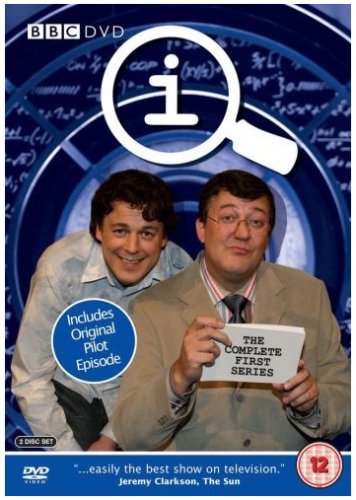
"You will hear things like, "Science doesn't know everything." Well, of course science doesn't know everything. But, because science doesn't know everything, it doesn't mean that science knows nothing. Science knows enough for us to be watched by a few million people now on television, for these lights to be working, for quite extraordinary miracles to have taken place in terms of the harnessing of the physical world and our dim approaches towards understanding it. And as Wittgenstein quite rightly said, 'When we understand every single secret of the universe, there will still be left the eternal mystery of the human heart.'"
Stephen Fry quoting Wittgenstein during a Room 101 TV program
We at age-of-the-sage hope that our visitors will find this "insight?" to be, potentially, Extremely Interesting:-
Some Human Mysteries?
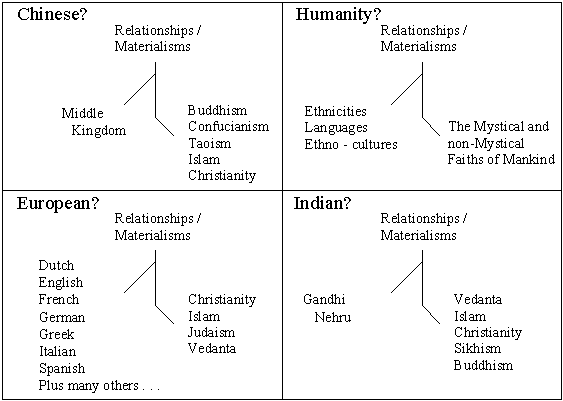
There is close agreement between several major World Faiths, Plato, Socrates, Shakespeare and Ralph Waldo Emerson in suggesting that Human Wisdom / Spirituality is relative to Human Desire / Materialism and to Human Wrath / (linkable with Ethnicity and group membership?).
Modern Psychological science seems to agree with these more philosophical and intuitive authorities!!!
An acceptance has existed over several centuries, whereby such luminaries as Leibniz and Aldous Huxley have subscribed to a so-called, "Perennial Philosophy", of core insights that are accepted by ALL the major Faith Traditions.
It may be that extensive researches undertaken by ourselves at age-of-the-sage can be seen as lending very persuasive support to acceptance of the existence of such a "Perennial Philosophy" actually exists!
